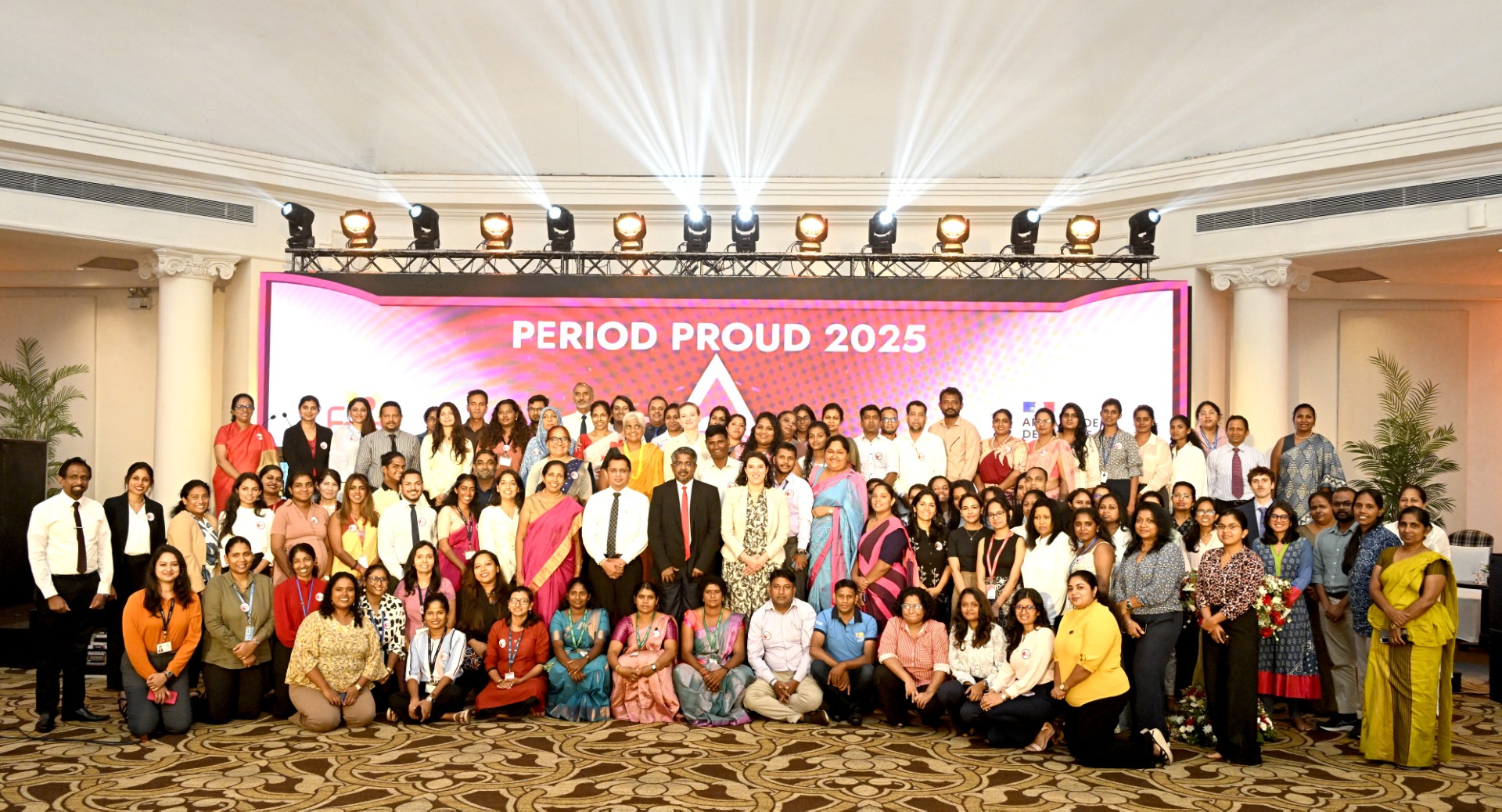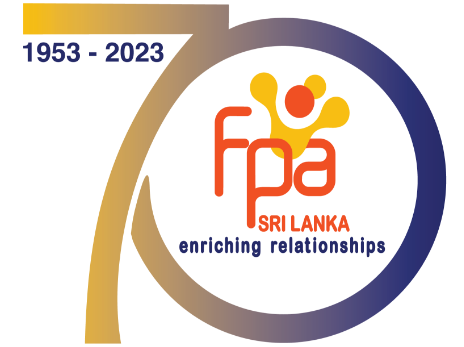Collective Action Against Period Poverty (CAAPP) Research Launch

The Family Planning Association of Sri Lanka (FPA Sri Lanka), in partnership with the Embassy of France in Sri Lanka and the Maldives, hosted the official launch of the Collective Action Against Period Poverty (CAAPP) project’s research findings today at the Galle Face Hotel, Colombo. This landmark event marks a critical step in addressing menstrual health and hygiene (MHH) challenges across the country, particularly in underserved and marginalized communities.
Launched in 2023, the CAAPP project is FPA Sri Lanka’s first dedicated programme focused exclusively on menstrual health and period poverty. The initiative operates in coordination with 13 partner NGOs primarily in the Northern and Central Provinces. Through this multi-stakeholder initiative, the CAAPP project aims to eliminate stigma, improve access to menstrual hygiene resources, and influence policy for a more equitable and period-friendly Sri Lanka.
The event commenced with opening addresses from Honourable Prime Minister Dr. Harini Amarasuriya and His Excellency Mr. Rémi Lambért, Ambassador of France to Sri Lanka and the Maldives, both reaffirming their governments’ and institutions’ shared commitment to promoting gender equality and bodily autonomy.
Honourable Prime Minister Dr. Harini Amarasuriya highlighted in her address:
“𝘛𝘩𝘦 𝘭𝘢𝘵𝘦𝘴𝘵 𝘳𝘦𝘴𝘦𝘢𝘳𝘤𝘩, 𝘧𝘰𝘤𝘶𝘴𝘦𝘥 𝘰𝘯 𝘤𝘰𝘮𝘮𝘶𝘯𝘪𝘵𝘪𝘦𝘴 𝘪𝘯 𝘛𝘳𝘪𝘯𝘤𝘰𝘮𝘢𝘭𝘦𝘦, 𝘒𝘢𝘯𝘥𝘺, 𝘢𝘯𝘥 𝘊𝘰𝘭𝘰𝘮𝘣𝘰, 𝘭𝘢𝘺𝘴 𝘣𝘢𝘳𝘦 𝘶𝘯𝘤𝘰𝘮𝘧𝘰𝘳𝘵𝘢𝘣𝘭𝘦 𝘵𝘳𝘶𝘵𝘩𝘴: 𝘵𝘰𝘰 𝘮𝘢𝘯𝘺 𝘨𝘪𝘳𝘭𝘴 𝘴𝘵𝘪𝘭𝘭 𝘮𝘪𝘴𝘴 𝘴𝘤𝘩𝘰𝘰𝘭 𝘣𝘦𝘤𝘢𝘶𝘴𝘦 𝘵𝘩𝘦𝘺 𝘭𝘢𝘤𝘬 𝘢𝘤𝘤𝘦𝘴𝘴 𝘵𝘰 𝘮𝘦𝘯𝘴𝘵𝘳𝘶𝘢𝘭 𝘱𝘳𝘰𝘥𝘶𝘤𝘵𝘴; 𝘵𝘰𝘰 𝘮𝘢𝘯𝘺 𝘸𝘰𝘮𝘦𝘯 𝘵𝘶𝘳𝘯 𝘵𝘰 𝘶𝘯𝘴𝘢𝘧𝘦 𝘢𝘭𝘵𝘦𝘳𝘯𝘢𝘵𝘪𝘷𝘦𝘴; 𝘢𝘯𝘥 𝘴𝘵𝘪𝘨𝘮𝘢 𝘤𝘰𝘯𝘵𝘪𝘯𝘶𝘦𝘴 𝘵𝘰 𝘴𝘪𝘭𝘦𝘯𝘤𝘦 𝘢𝘯𝘥 𝘪𝘴𝘰𝘭𝘢𝘵𝘦. 𝘛𝘩𝘪𝘴 𝘮𝘶𝘴𝘵 𝘤𝘩𝘢𝘯𝘨𝘦. 𝘞𝘦 𝘮𝘶𝘴𝘵 𝘢𝘤𝘵—𝘶𝘳𝘨𝘦𝘯𝘵𝘭𝘺 𝘢𝘯𝘥 𝘥𝘦𝘤𝘪𝘴𝘪𝘷𝘦𝘭𝘺—𝘵𝘰 𝘦𝘯𝘴𝘶𝘳𝘦 𝘵𝘩𝘢𝘵 𝘮𝘦𝘯𝘴𝘵𝘳𝘶𝘢𝘵𝘪𝘰𝘯 𝘥𝘰𝘦𝘴 𝘯𝘰𝘵 𝘩𝘪𝘯𝘥𝘦𝘳 𝘢𝘯𝘺𝘰𝘯𝘦'𝘴 𝘩𝘦𝘢𝘭𝘵𝘩, 𝘦𝘥𝘶𝘤𝘢𝘵𝘪𝘰𝘯, 𝘰𝘳 𝘥𝘪𝘨𝘯𝘪𝘵𝘺.”
Research presentations highlighted the complex and localized realities of menstrual health in Sri Lanka.
- The Centre for Poverty Analysis (CEPA) explored knowledge, attitudes, and practices around menstrual hygiene in selected communities in Colombo and Nuwara Eliya.
- The Human Development Organization (HDO) shared findings from their work with plantation communities in Kandy and Nuwara Eliya, revealing the intersection of socio-economic barriers and cultural taboos.
- The Rural Economic and Community Development Organization (RECDO) presented a study on menstrual health, cultural influences, and institutional practices among Muslim girls in Trincomalee.
Following the research session, a multi-agency panel discussion enabled deeper dialogue on how evidence-based insights can inform national policy and ground-level interventions. Participants engaged in a Q&A session, reflecting on the need for intersectional and inclusive approaches.
A major highlight was the launch of “Period Proud – Stories from the Frontline of Change”, a publication documenting both the pre-intervention landscape and the coordinated multi-partner response implemented through the CAAPP project. The publication captures community voices and celebrates grassroots progress in dismantling period stigma.
The event concluded with a powerful Bharatanatyam performance by Abhirami, symbolically portraying the struggle against stigma and discrimination linked to menstruation, reminding all present of the emotional, cultural, and societal dimensions of period poverty.
His Excellency Mr. Lambért emphasized;
“The CAAPP project has allowed us to collectively reflect on sustainable solutions, with a positive and lasting impact on the lives of thousands of women and girls. The research and evidence generated by our partners will help shape long-term responses rooted in local expertise.”
Today’s research launch reinforces the importance of collective action, community-led solutions, and evidence-driven policy advocacy to ensure menstrual health is a right, not a privilege.
.png)


